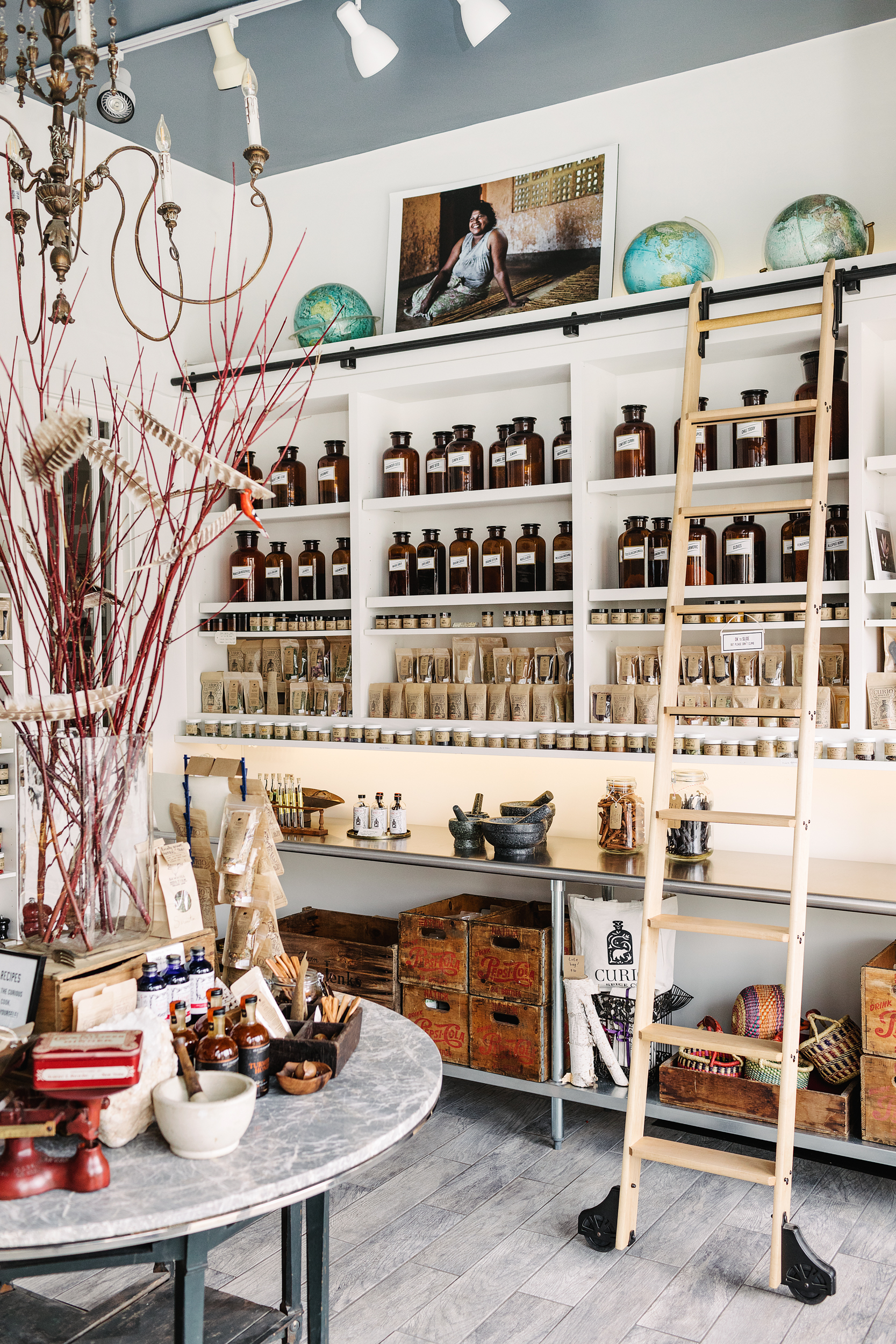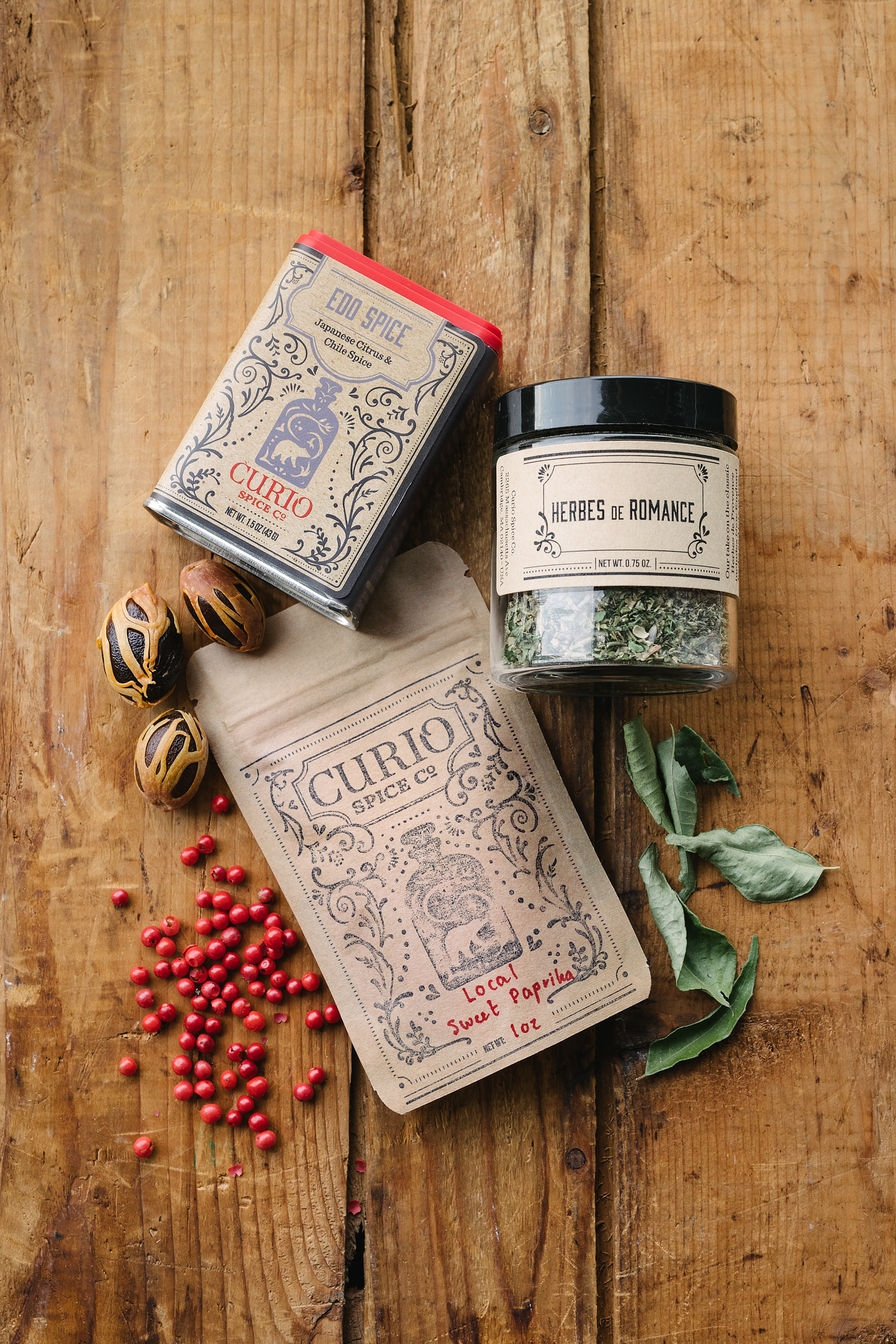Curio Spice Shop
Photos by Adam Detour
The moment you set foot inside Curio Spice Co.—Claire Cheney’s shop just outside Porter Square in Cambridge—your senses are in for a real treat. It’s like a warm bath of all the good smells you could imagine at once. As you settle in and sniff from her highly curated collection, you can appreciate each spice and spice blend for what it is and envision its culinary applications.
You’ll find the unusual and the unexpected: Where else will you see voatsiperifery wild pepper from Madagascar? Even household names feature something special: sweet paprika, sourced directly from Meggie’s Farm in Rehoboth, Massachusetts, is the most brilliant shade of orange—you won’t find that in any mass-manufactured spice jar. Then there are clever takes on familiar favorites: Herbes de Romance is a nod to love—Cheney invented it as a favor for her brother’s wedding—and a celebration of local herbs, featuring Massachusetts rosemary and lemon verbena and wild Maine oregano, in place of the typical Provençal herbs.
Specializing in directly sourced, sustainably produced spices from around the world, many of which are rare and hard to find, Curio aims to pay tribute to the farmers and their harvests.
“One of the main missions of the business and the inspiration for starting it was to tell the stories of where the spices come from,” says Cheney, an Arlington resident. “It’s the ethical, sustainable aspect as well. It’s been my mission to pull spices out of the commodity market and honor them for the beautiful ingredients that they are.”
Following years of researching spices and their origins—including traveling to far-flung places to harvest them—Cheney founded Curio as a business in early 2015, selling wholesale and online, and opened the Cambridge storefront in November 2016.
Cheney will tell you it all started with saffron. In 2006, while working on a college poetry project, Cheney was struck by a photograph of a Greek fresco depicting women harvesting saffron crocus and offering it to a goddess in Akrotiri, a Minoan Bronze Age settlement. Not only was she intrigued by the image, but she also felt an immediate connection, recalling picking crocus as a child. “Something bound us together, something fragrant and fragile that I knew I must explore,” Cheney writes in The Art of the Harvest, her 2013 self-published account of the Greek saffron harvest. That fresco made such an impression on Cheney that years after the poetry project was complete, she dug deeper into saffron, taking on a personal research project that culminated in the book.
It was that research that led her down the many roads that ultimately led to Curio. Her interview with Ana Sortun, owner and executive chef of Cambridge’s Oleana, proved pivotal.
“I’ve got to interview this woman who wrote a book called Spice,” she remembers thinking. The two hit it off, ultimately leading to Cheney’s gig as assistant manager at Oleana. “I did mostly front of house but because of my passion for spices, they let me do a spice seminar at family meal for staff. Once or twice a week, I’d pick a spice that was used on the menu and go through the history, science and flavor profile. Ana really encouraged my interest and passion.”
Following her stint at Oleana, Cheney worked as a manager at its sister establishment, Sofra, where she blended and sold her own spices under the restaurant’s name.
Cheney had always cooked and experimented with spices, and even made her own salt blends, but this opportunity allowed her to take that interest to a new level, a chance to improvise and create her own blends in a nurturing environment under the tutelage of experts.
This work energized Cheney so much that while at Sofra, she launched a Kickstarter campaign for her research project and to help fund the book’s publication. She raised enough money and was granted the time off to travel to Greece to harvest saffron.
Upon return, Cheney resumed work at Sofra, but thought more and more about starting a venture of her own. “I was blending and selling spices under Sofra,” Cheney says. “I loved doing it so much that I thought, ‘Why don’t I do this full time?’”
She started a blog, Aromatum, and made plans for a business. She moved to Thailand for four months in 2014 to do more spice sourcing. From Bangkok, she traveled to other locations including Vietnam, Cambodia, India and Sri Lanka. “It was a great way to clear my head and center my thoughts around the idea of a business, sourcing spices ethically and sustainably and then turning them into blends.”
When Cheney returned, she had a business plan. She took classes at the Center for Women & Enterprise and talked to other business owners as she took steps to realize her vision for a spice shop. She was at once intentional and whimsical in naming the business. Curio is a take on the traditional concept of a curiosity cabinet: a place to put things from one’s travels and other curious items. It’s also known as a “cabinet of wonder.” “I love that idea, the whole shop as a wonder cabinet,” she says.
Indeed, the shop lives up to its name and reflects Cheney’s own insatiable curiosity and sense of adventure.
On a recent winter night, Cheney shows me around the shop, proudly sharing the stories of many of the spices. Each is packaged as carefully as it was curated; all the labels provide details of origin and suggested uses, and feature a graphic of a bear—the best sniffer in the animal kingdom.
Retail manager Leah Pappas-Barnes is measuring and packaging Kozani, Curio’s first official spice product, a Greek-inspired herb and saffron blend named for the region in Greece where saffron is harvested and where Cheney worked on the farm. “I think I was trying to express the flavors I experienced when I was in that region,” Cheney says. Incidentally, she improvised with saffron; while it’s harvested in Greece, it’s rarely used in the country’s signature cuisine.
For Curio’s Aegean salt blend, Cheney introduces mastic, which comes from harvesting tree resin on the Greek island Chios, and pairs it with Cyprus sea salt, lemon and thyme. “It’s mostly used in baking and alcohol but I found that it has a very piney, foresty flavor that I think is nice and savory,” she says.
There’s Supeq, Curio’s hyperlocal, unami-flavored blend, featuring seaweed, sea salt, shiitake mushroom, ginger, paprika, nettle and hot chili, all sourced from New England. “When you think about the folklore of spices, you think of far-flung lands,” Cheney says. “I want to show that you can get everything from New England and it can be really good.”
To Cheney, the possibilities for spices are endless. During her time managing a coffee shop, she enjoyed learning about the terroir of the beans but found the industry limiting because there’s mainly one species of beans (Arabica). With spices, “it seems as though there is this incredible, endless journey before me: a lifetime of adventures.”
Once you’ve experienced Curio’s spices, you’ll be grateful for Cheney’s curiosity and for the fact that she plans to keep at this for a long time.
In addition to retail products, Curio Spice Co. offers bulk spices to restaurants and producers, and wholesale to specialty retailers. Visit curiospice.com for information about products, events and classes.
This story appeared in the Spring 2018 issue.


